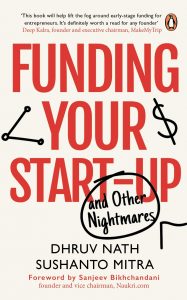
The world is definitely buzzing with intrepid entrepreneurship and most of us are starting-up and striking out!
Amidst this thrilling zeitgeist though, the problem of funding remains, especially in the post-COVID-19 world, where money is scarce.
Dhruv Nath and Sushanto Mitra come to the rescue with Funding Your Startup And Other Nightmares It taking you through stories of early-stage start-ups, and their hits and misses in the journey to raise funding.

Funding Your Startup And Other Nightmares
Dhruv Nath, Sushanto Mitra
The authors also interview some of the most accomplished founders in the world of business, such as Deep Kalra of MakeMyTrip, Yashish Dahiya of PolicyBazaar, Dinesh Agarwal of IndiaMART and Sairee Chahal of SHEROES. Their stories all come together in a useful ‘PERSISTENT’ framework, which helps make a start-up investment-ready.
Read on for seven invaluable tips about the basics of funding that will help you launch straight onto entrepreneurial superstardom.
- Treat your customers with the same awe you do investors, because it’s their money that is crucial for a business in the long run
Always remember, the customer’s money is much better than the investor’s money—as long as it is
coming in regularly, and is higher than your costs. Because you then have a viable business. This is especially important in the post COVID-19 world. And if you are getting the customer’s money,
you will almost certainly get the investor’s money.
- While entrepreneurs are understandably concerned about giving too much of their stake away, you need to focus on what’s best for growing your business.
Well, first of all, if you need funding to grow rapidly, you need it. Do not worry too much about the valuation and the stake you are letting go. Obviously you must try and get the best deal you can, but get the funding. It’ll help you grow rapidly, and your next round can then be at a significantly higher valuation. So while you may have parted with a significant stake in the first round, you can actually get far more for a proportionately lower stake in the next round
- Crises can turn investors risk-averse and more likely to insist on a lower valuation. Here is a great option to handle this
There is another interesting option. Raise the money right now, without fixing the valuation at the moment. Instead, link it to the subsequent round of funding. How does this work? Well, let’s call
this Funding Round 1. And at some stage you will be raising Funding Round 2. You could then set the valuation in Round 1 at a 20 per cent discount (or any percentage that both sides can agree to) to the
valuation arrived at in Round 2.
- To create maximum impact in the least time, brevity is the name of the game! WYKM (what’s your key message- and deliver it!
One simple, key idea. Which is easy to understand, absorb and, therefore, remember. Nothing huge, not hundreds of words, or tens of ideas. One simple message—that’s it. And therefore, ladies and gentlemen, the recipient gets the message and remembers it!
- Multi-tranche or staggered investments, released as you continue to meet milestones are great for start-ups looking to prove traction.
In other words, we’ll give you the money in two tranches. Based on the first tranche, let’s set a milestone. Once you meet that, we’ll release the second tranche. By the way, the second tranche could even be at a higher valuation.’ Incidentally, this is not an informal arrangement. It actually becomes part of the term sheet and ultimately the shareholder agreement.
- While you’re on tenterhooks waiting for your investors to choose you, make sure you choose your investors wisely and well
More than just the money, it’s important to get it from the right investor. Someone whose thinking is aligned with yours and who is ideally passionate about the business as well. Someone who can add
value and not keep breathing down your neck asking for a quick exit.
- Angel networks, gathering investments from a large number of investors are one of the best bets for start-ups and much more accessible than venture capitalists at first.
Who provides this support? Very simply, the angel network. So the network evaluates each start-up and then shortlists the ones that seem the most promising. The founders are then asked to make a presentation or pitch. After the pitch session, start-ups that investors are interested in are evaluated in further detail (unfortunately, the others go home with coffee and cookies). Finally, those that are ripe for investment are given a term sheet. Which is rather like an MoU.








